We had something to say, not something to sell
We are delighted to post this ‘guest blog’ by Carry Gorney – this is made up of excerpts from Carry’s book, Send me a parcel with a hundred lovely things.
The title of this blog post comes from Suze Rotolo A memoir of Greenwich Village in the sixties (2008).
I’m ready to go anywhere, I’m ready for to fade
Into my own parade, cast your dancing spell my way
I promise to go under it.’
Tambourine Man’ – Bob Dylan (1964)
1968
I am a street performer living and working co-operatively. Our wish is to create contexts based on shared human values and beliefs. Those of us who became part of the counterculture were influenced by Marxism, communism, socialism, anarchism (and all their overlaps). Across the individual rhetoric groups were unified by opposition to war, especially war in defence of capitalist expansion. The common cry was that the world needed to be changed.
We see ourselves as activists, our work at the grass roots is based on dreams of equality of opportunity and education. We are committed to unleashing creativity , believing it to be the essence of all human life and that the potential to heal is embedded in the arts. The question for us is not simply where to work but for whom, and with whom. We belong on the street, in derelict buildings and squats. These are our homes and our theatres. We are collaborators, developing projects. The development of theatre in challenging contexts and with vulnerable participants becomes the focus of our work.
We have little interest in money. State funding is available to experiment with social and artistic interventions. We forge new ways of working. The roots of our work are not in evidence-based practice but in innovation, respect, equality, action research and, above all, being ourselves. John Lennon had proclaimed in 1968: “I am a revolutionary artist.” We became bricoloeurs, early re-cyclers, using waste to create art on the streets. Art and creativity was a right that belonged to everyone, not just an expression of the elite.
Theatre Leeds – 1972
I am in a street procession as Merlin, the wizard. I wear a dark blue robe down to my feet, embellished with silver stars and golden moons.
Banners are strung across the narrow alleys inviting everyone to join King Arthur on Strawberry Lane, the bombsite designated to become Camelot.
The procession is led by a huge dragon, billowing smoke. Arthur pulls the sword out of the stone and I crown him with his foil crown. We invite all the children to join us for the following three weeks to become Knights of the Round Table. This becomes the seat of democracy in West Leeds.
During the final week, parents collect money for the barbecue and bonfire, the grand celebration and finale of the whole programme. Camelot would be burnt.
Children and parents come out at night in a procession carrying flares, playing music and dancing together. They fasten fireworks to the wooden structures built during the summer. Families toast marshmallows over the barbecue, grill sausages and bake potatoes.
We had started with a procession and ended with a barbecue.
Children gaze in awe at the huge flames as Camelot burns and late into the night we still sit around the embers, our faces across the circle glowing in the light of the flames.
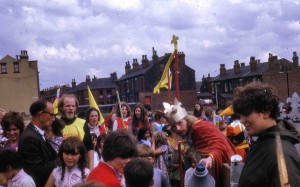
Milton Keynes – 1976
We appear like a band of troubadours from the middle ages, performing for the recent arrivals to the new town in the middle of the Buckinghamshire countryside. Our mission is community, to create a shared experience. This play invites children to spend their holiday creating a time capsule that will be buried in the ground. We explore how future generations might understand our new town through artefacts. Together we will illustrate an account of our present lives and turn these into stories for the future.
Our procession of performers, volunteers, children, parents and musicians, all wear vivid costumes and carry banners inviting children to follow. We snake our way through a maze of new estates, crossing main roads.
We pull a cart, constructed out of an old pram chassis with wheels. Strapped to it are oil drums, pieces of metal, grates, grills, cymbals, which when beaten send a cacophony of rhythms reverberating around the streets. These are, accompanied by saxophone and clarinets. At intervals the bandleader blows his whistle, everything stops and when the procession is silent we burst into a verse of the song that presents the theme of our drama.
Music was the heartbeat to evoke the spirit of Milton Keynes. It is music that opens its arms to embrace everyone; influenced by African drumbeats, Mexican mariachi and the protest songs of Bob Dylan.
We think fast, playing word games with adolescents to gain their support. We link arms, everyone dances, swinging partners round, stepping to the left, stepping to the right and eventually returning to the form of the circle.
We are community, a moment of belonging for ourselves and each other in Milton Keynes. We are linking the lives of strangers through the magic of theatre.
Through spells and incantations
She worked out the translations
The key to all our dreams
Is right here in Milton Keynes
I visited Valencia for Las Fallas, fire festival and stood amongst the crowds surrounding neighbourhood bonfires whilst huge effigies of winter were burnt, making way for Spring’s new beginning.
A few weeks later, Seville, Semana Santa, I am standing with millions of people thronging the street, weeping as the beautiful Madonna is borne aloft, adorned with lace, illuminated by candles.
February, I stand freezing at 4am, it’s dark, the clock chimes, and the people of Basel take over the streets, wearing giant animal heads and bobbing lanterns, shrill flutes and beating of drums, footsteps on cobbles.
I am witnessing how these ceremonies create unity and community amongst participants.
Our 1970s street theatre aimed to reach the most deprived and isolated areas of our community. We created rituals and initiated celebrations, full of joy and hope; here was a conscious political act, rooted in religious and social practices which have taken place in Europe over centuries.

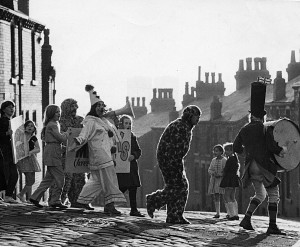
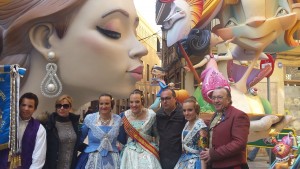
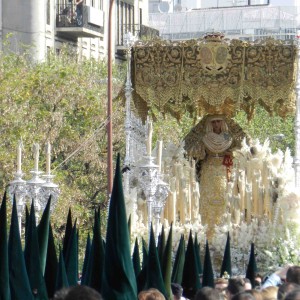
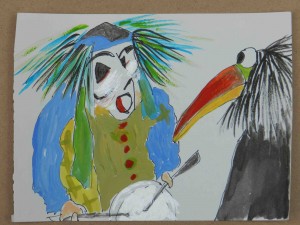
Comments are closed
Sorry, but you cannot leave a comment for this post.